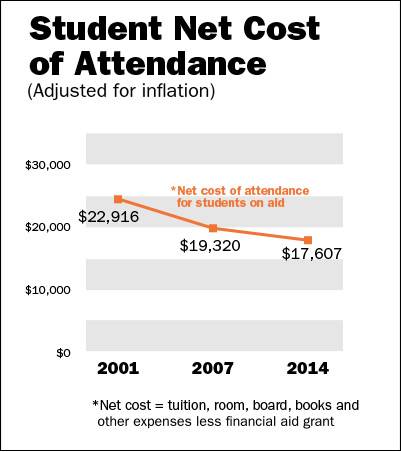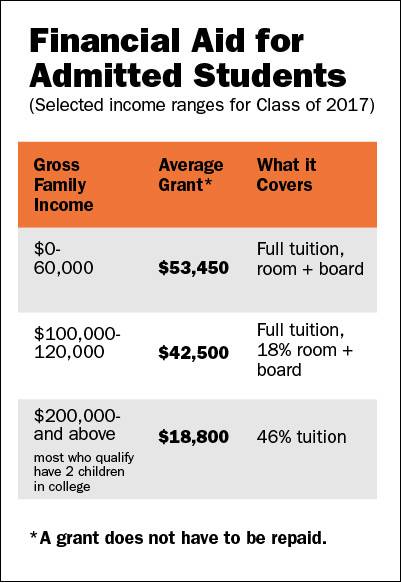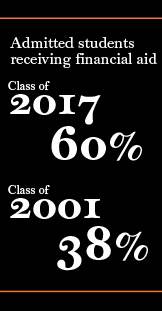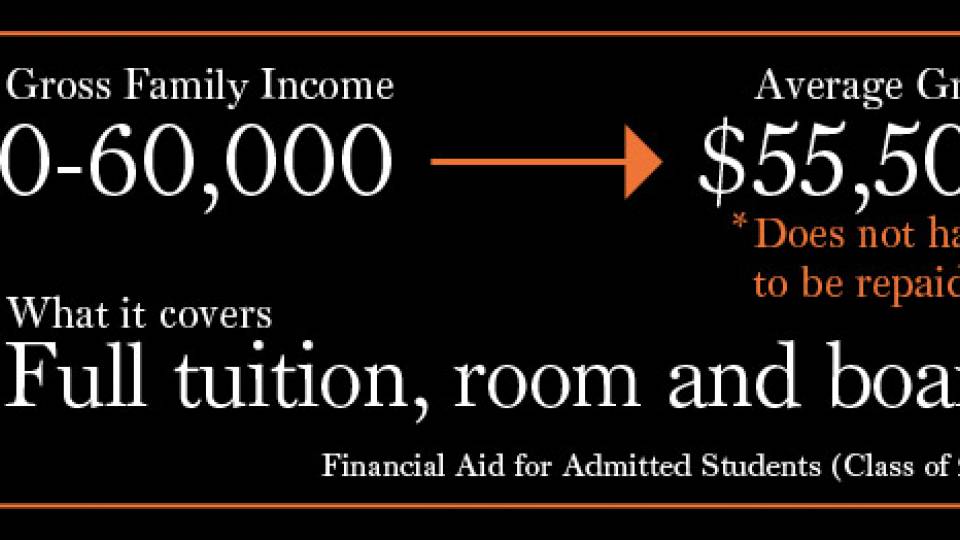
Princeton University trustees Jan. 25 approved an 8.5 percent increase in undergraduate financial aid to $131.6 million in adopting the University’s operating budget for 2014-15.
The University's pioneering financial aid program is committed to providing access and affordability to students from all economic backgrounds without a required loan. This gives Princeton students the opportunity to graduate without debt. Currently approximately 60 percent of the undergraduate student body receives financial aid.
The budget includes a 4.1 percent increase in undergraduate tuition to $41,820. The majority of students will not be affected by the increase because Princeton's financial aid policy adjusts awards for students on aid to offset increases in fees. The projected average grant for an undergraduate student on financial aid in the Class of 2018 that is admitted this spring will be $42,700.
"This budget reflects our commitment to making sure that a Princeton education is accessible to any student who is admitted," Provost David Lee said. "This is important as we enhance our efforts to increase the economic diversity of our undergraduate population."
The University has been widely recognized for its affordability and financial aid program, which provides need-based grants that do not have to be repaid.
Aid increase outpaces tuition increase
"The 8.5 percent increase in the financial aid budget is much greater than the increase in the fee package," Lee said.
Princeton's scholarship spending has outpaced fee increases for 13 of the last 14 years and its average annual fee package increase has been among the lowest in the nation for the past 17 years. As a result, when adjusted for inflation, the average "net cost" for Princeton students on aid today is 20 percent lower than it was in 2001, Lee said.
The budget proposal, which was based on the recommendations of the Priorities Committee of the Council of the Princeton University Community, was presented to the trustees by President Christopher L. Eisgruber during a meeting Jan. 25. The provost chairs the committee, which is made up of faculty, students and staff.
Fee package
The total undergraduate fee package increase includes the 4.1 percent tuition increase to $41,820; a 4.9 percent increase in room charges to $7,570; and a 3.2 percent increase in board rates to $6,050 for a full meal plan. Even with the increase, Princeton’s fee package for the 2014-15 year will be about $800 below the lowest 2013-14 fee package among its closest competitors.
The approved $1.6 billion budget includes a 4.1 percent ($1,650) increase in the regular graduate tuition to $41,820, the same as undergraduate tuition, and a comparable increase in the Dissertation Completion Enrollment (DCE) graduate tuition to $3,160. There will be no increase in the Student Health Plan fee.
The budget includes increases ranging from 3 percent to 5 percent in faculty and staff housing rates, increases ranging from 3 percent to 4 percent in graduate student apartment rates, and a 3.5 percent increase in graduate student stipends.

Competition for talent
Lee said the University continues to face significant competition for its top faculty members.
"In this environment of aggressive recruitment, lagging salaries could make us vulnerable to losing our best talent to our peers," Lee said. "Providing competitive salary pools and appropriately rewarding the University's faculty members is the most effective and fair way to maintain our world-class faculty."
Similar pressures can be seen among the staff population. Last year's committee approved a staff salary pool that gave managers greater ability to recognize different levels of performance and provide resources for departments to reward and retain top talent. The committee approved a similar proposal this year, and the overall increases in faculty and staff salary pools are the same as last year’s.
Cost savings
In the wake of the University's enhanced central cost-saving initiatives during the last economic recession, the University established SUMAR (a committee on Strengthening University Management and Resources) to enhance management and continue to identify and implement cost efficiencies.
SUMAR's five priorities are multi-year energy and utility savings, reforming the human resources compensation process, procurement efficiency, financial management tools, and managing health care costs.
"In the four years since its inception, SUMAR has tracked more than 60 projects with a total potential savings of approximately $16 million per year," Lee said.
High-priority needs
This year the committee allocated new funding to address what it determined to be the University’s highest needs and emerging priorities. Due to budgetary constraints, the amount was half of what was available to the committee last year.
The approved budget includes funding for the following:
- Staffing in the office of the Dean of the College to enhance undergraduate teaching and learning and expand activities in support of undergraduate research.
- Activities to improve the safety and support of students through education about sexual misconduct; enlisting male students as advocates against sexual violence; and the development and evaluation of a comprehensive program to educate and train students to be active bystanders.
- Funding to provide graduate students who are non-residents of the Graduate College with six free meals per semester in the dining hall to foster a vibrant residential community and participation in professional development programs.
- Staffing in the Office of Information Technology to further strengthen the University’s digital and electronic infrastructure.
- Staffing in the Office of Communications to enhance the University’s social media presence.
Lee said that even though the financial markets have been strong this year, it would be unwise to develop budgets on the basis of the returns of the past.
"In the decade ahead, we will need to manage growth with careful attention to optimizing resources to best support our priorities," Lee said. "As noted in last year’s report, one of the University’s challenges will be to reset community expectations for growth that were driven by almost 20 years of exceptionally favorable investment conditions that may well not return in the foreseeable future."
The Priorities Committee report is available for download in PDF format as well as from the Office of the Provost.

